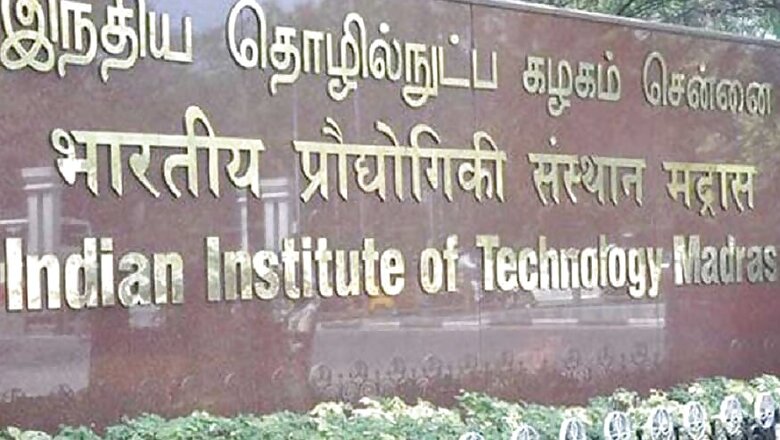
views
Indian Institute of Technology, Madras has been ranked the number one engineering institute in India for five consecutive years and number one in the ‘overall’ category for the second year in a row in the central government's National Institutional Ranking Framework. On the other hand the Institute of Eminence has slipped in the QS World University Rankings 2021. Director Prof Bhaskar Ramamurthi spoke to News18.com on the two developments. He also shared the experience of digital teaching learning in IIT Madras, which caused a lot of inconvenience to students with little access and internet provisions. As a result the focus is to get them on campus first after reopening along with the research scholars. Excerpts:
For the fifth time, consecutively, IIT Madras has occupied the top position in the National Institutional Ranking Framework (NIRF). What are the reasons for this consistent performance?
We are proud to have been accorded this recognition.All IITs play important roles in nation-building. IIT Madras has ensured that the pedagogy and the strengths of the institute are leveraged optimally. The Institute nurtures research on transformational technologies that have the potential to address the societal challenges faced in India today. These included the creation of the requisite infrastructure for the expansion, increasing the faculty strength and increasing the number of PhD scholars and the research output. These are formulated in a manner that builds on the strengths of IIT Madras and the aspirations of the faculty, staff and students.
In particular, aspects unique to IIT Madras, such as the IIT Madras Research Park, the strong linkages with industry, the incubation ecosystem and the large groups working on transformational technologies that impact people’s lives, are leveraged.
We collectively engage with faculty and students in drawing up a roadmap to improve our performance based on quantified targets like increasing faculty strength, student exchanges with global universities, good placements, good quality high impact research, an entrepreneurial and innovation culture on campus to continue to make remarkable strides in our progress.
IIT Madras has a strategic plan in place, which focuses on the same aspects that are also covered under NIRF rankings such as qualified and experienced faculty, rapidly increasing publication quality and count, better student-faculty ratio, greater industry-academic interface which is well reflected through the high amount of industrial consultancy and sponsored research programmes undertaken by the institute and so on. This plan has now been extended to meet the objectives as an Institute of Eminence.
Additionally, IIT Madras has also created a strong entrepreneurial ecosystem that encourages students to become job-generators. The IIT Madras incubation cell is India’s leading deep technology startup hub with innovation and impact as key differentiators/drivers.
Over 195 deep tech startups have incubated till date in sectors like manufacturing, IoT, energy/renewables, healthcare/medical devices, water, edu-tech/skill development, agri-tech, robotics, AI, ML, data analytics, AR/VR, and enterprise.
On the other hand, just the day before IIT Madras along with other Institutes of Eminence, (IITs) except OP Jindal Global University, showed a slip in QS World University Rankings 2021 in the past one year. IIT Madras is at 275 from 271 and in 2018-19 it was 264 for two years. What are the reasons behind the slip in international ranking this time?
Different ranking systems have varying metrics including strongly subjective ones based on perception. The international rankings employ two measurable metrics – faculty-student ratio and research citations per faculty. As a growing institute, we are increasing both student intake and faculty strength. The faculty-student ratio changes significantly from year to year as does the citations per faculty.
There is much emphasis on internationalisation of a campus in world rankings. As compared to the global median, some of the IITs have international faculty and students much below the global median. How do you plan to work on that?
The ministry of human resource development has created some scholarships for foreign PhD students, and we hope to increase their number. It is not possible to increase the number of foreign students at the UG level since all intake is only through JEE and very few foreign students will come through this route.
What kind of challenges do you see in academic activity due to Covid-19? How would you want to counter them?
The biggest and immediate challenge will be to return to normalcy, while maintaining safe practices. We are not sure when IIT Madras will be permitted to reopen and who among our students will be able to travel safely to the Institute.
Even when this becomes possible, with just about 6,000 hostel rooms on a single-occupancy basis, we expect that only some of the continuing students can return to the campus. The research scholars whose work has ground to a halt will be the first ones to return to campus. The fresh intake for academic year 2020-21, whenever they are admitted, will have to be accommodated on campus as well. Continuing students who are doing only coursework will most probably have to continue with online classes for one more semester. It will be a big challenge to get our research activities back to the normal levels and move forward from there.
How are you preparing for the next semester in these challenging times of social distancing and Covid-19?
We have completed the Jan-May 2020 semester for graduating students by holding online viva exams, assignments, etc. We plan to hold exams for continuing students at a later date whenever it is feasible to do so. We propose to start online classes for continuing students in August for the next semester. All lab courses will be postponed to a later date when students are able to come back. As and when it is safe for the research scholars to return, we will first get them back. Along with them, we will also get back other students with poor internet connectivity and those who need to do experimental work. We are unclear when the admissions for the UG and PG programmes will be completed. We presume that by that time it will be possible to receive the new students on campus for their first semester.
Could you weigh for us the pros and cons of online education, and how do you see the problem it poses of digital disparity in access to education?
The institute has completed all courses for the Jan-May 2020 semester online and reached every student. Some students could only download the lectures and not join them live. A few could not even do this from their homes, and had to go to a nearby institution or browsing center.
There are thus primarily two challenges: (i) all students did not have the required quality of internet access for live participation in classes, with a few not having access at all (ii) some of the faculty were new to online pedagogy.
While the second problem has been overcome by now, the issue of students with poor or no internet access (small number) remains. To address this, we propose to bring at least those students with no access or very poor access to the campus as soon as it is possible to do so, even if it is only to enable them to access the Internet from the safety of their hostel rooms.
Could you tell us how IIT Madras is contributing in the fight against Covid-19?
IIT Madras is already at the forefront of research and innovation in helping the nation tackle the Covid-19 pandemic.
IIT Madras is leading an effort that has created a live online tool Itihas which along with Aarogya Setu predicts emerging Covid-19 hotspots down to the street level. All state health departments are using this tool on a daily basis. IIT Madras-incubated startups and faculty have already come out with innovations such as a 'smart bin' that can assist in safe disposal of wastes in quarantine areas. PPEs made from 3D printing and commonly-available stationery materials. Affordable respiratory assist device for intensive healthcare. A nanoparticle coating material to inactivate coronavirus on contact. Designed and rapidly constructed modular ‘doffing unit’ for safe removal of PPE. Developed wearable tracker for early detection of Covid-19 symptoms, and partnered with the industry to develop a touchless sanitizer dispenser for vehicles.
The institute, through its incubation cell, research park and other bodies such as centre for innovation and Nirmaan, will continue to encourage and support students and faculty to innovate and come up with solutions to help the country solve pressing problems, not only in the fight against Covid-19 but in all walks of life.

















Comments
0 comment